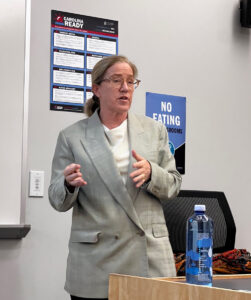
This Fall, the Department of History and the Center for Middle East and Islamic Studies have launched a groundbreaking lecture series bringing cutting edge historians of the Middle East and Central Asia to campus. The series, entitled “Legacies of the Middle Eastern and Muslim Experience of the 20th Century,“ will extend across the academic year. Its first lecture, held in October, was delivered by Professor Elisabeth Leake of Tufts University on her new book, Afghan Crucible: the Soviet Invasion and the Making of Modern Afghanistan (Oxford, 2022). On November 14, 2022, Professor Caroline Elkins of Harvard University delivered the second talk of the series, entitled “Legacy of Violence: A History of the British Empire in Palestine.“ A conversation I had with Professor Elkins during her visit gives me the opportunity to acquaint our community with both the novelty and importance of the book in the field, as well as the significant and sometimes topical issues and points Elkins raises.
Caroline Elkins received her Ph.D from Harvard University and has written or edited four books, as well as numerous articles and book chapters. In 2006, Elkins was awarded the Pulitzer Prize for her 2005 book Imperial Reckoning: The Untold Story of Britain’s Gulag in Kenya, and most recently, she published her wide-ranging and highly acclaimed book The Legacy of Violence: A History of the British Empire. This book offers comprehensive conclusions and critiques of both the past and the present of the British Empire. Elkins traces the contexts and ways in which the British Empire used violence from the second half of the nineteenth century to the period of decolonization that emerged after the Second World War. Her analysis extends beyond East Africa, the focus of her first book, to India, Cyprus, and Palestine-Israel. Throughout this journey, Elkins highlights two important concepts that define the British Empire and the Pax Britannica: liberal imperialism and legalized lawlessness. In fact, as Elkins points out, these are two highly interconnected concepts, with two seemingly contradictory faces. Both concepts highlight where, and under what conditions, violence is an indispensable element of empire.
In particular, Elkins incorporates many critiques of empire into her narrative, emphasizing that Britain was a liberal empire, not a fascist one. Here, liberal imperialism put Britain in an exceptional position in terms of its ability to juxtapose reform and violence. Liberal imperialism created its own vocabulary, using terms such as “civilizing mission,” and “trusteeship,” and perceived all colonized societies as both backward and infantile. Thus, liberal imperialism prepared the ground for the moral impact of violence. This liberal project, which also included social reform, incorporated “civilizing” backward societies, following the definition of “good government” by philosophers such as John Stuart Mill. A distinctive characteristic of the British case was that violence and coercion were not only a way of establishing control over colonized communities; they also formed part of a development and progression culminating in independence. At this point, Elkins argues that legal lawlessness is also an important concept in understanding how this ground for the use of violence is prepared.
The British Empire did not neglect to provide a legal basis for its actions. Elkins defines these attempts at legalization as legal lawlessness. According to her, the British Empire used the attempt to bring the rule of law to “backward” and “uncivilized” societies as a central idea to justify its actions. In doing so, it legalized practices that had previously been illegal, giving rise to the concept of legal lawlessness. Elkins emphasizes that this legacy of legalized lawlessness should be considered an important contributor to the questioning of democratic defects in many countries of the Global South that are now independent but were formerly under British colonial rule. Such a legacy can therefore be seen to still provide clues to how the British Empire shaped the world today.
The ways in which the British Empire remains with us today is a subject of hot debate among scholars and in the public arena. Although the empire seems to have disintegrated as a result of the decolonization period after the Second World War, Elkins states that it is still influential, which we can see in the debates about Brexit and the Commonwealth’s existence today. Even if the Empire no longer exists, British identity is an imperial identity, and this identity profoundly influenced the Brexit debate and its outcome. According to polls, around sixty percent of the UK population says that the Empire provides an identity to be proud of. This identity is also relevant to the Commonwealth, an organization that is inconceivable without the empire, but also about the monarchy’s determination to continue the legacy of the empire in some form.
Creating an empire of its own, Britain both influenced the past and continues to influence the present with its legacy. The empire destroyed literally tons of documents, especially those relating to the Mau Mau movement and the concentration camps in Kenya, and had most of the rest shipped to Britain, yet it has not escaped the scrutiny of historians like Elkins. Her answer to the question “Can we see any parallels and similarities between Nazi Germany and the British Empire through Hannah Arendt’s explanation of ‘The Banality of Evil’?” briefly demonstrates how the British Empire should be defined. Although we can see the “Banality of Evil” through the workers in different colonies of the Empire, Britain was not a fascist and totalitarian empire, but a liberal imperial empire.
-Burak Bulkan
